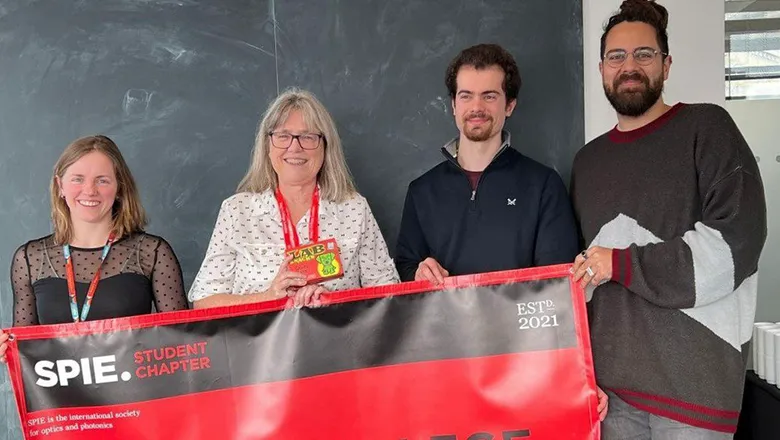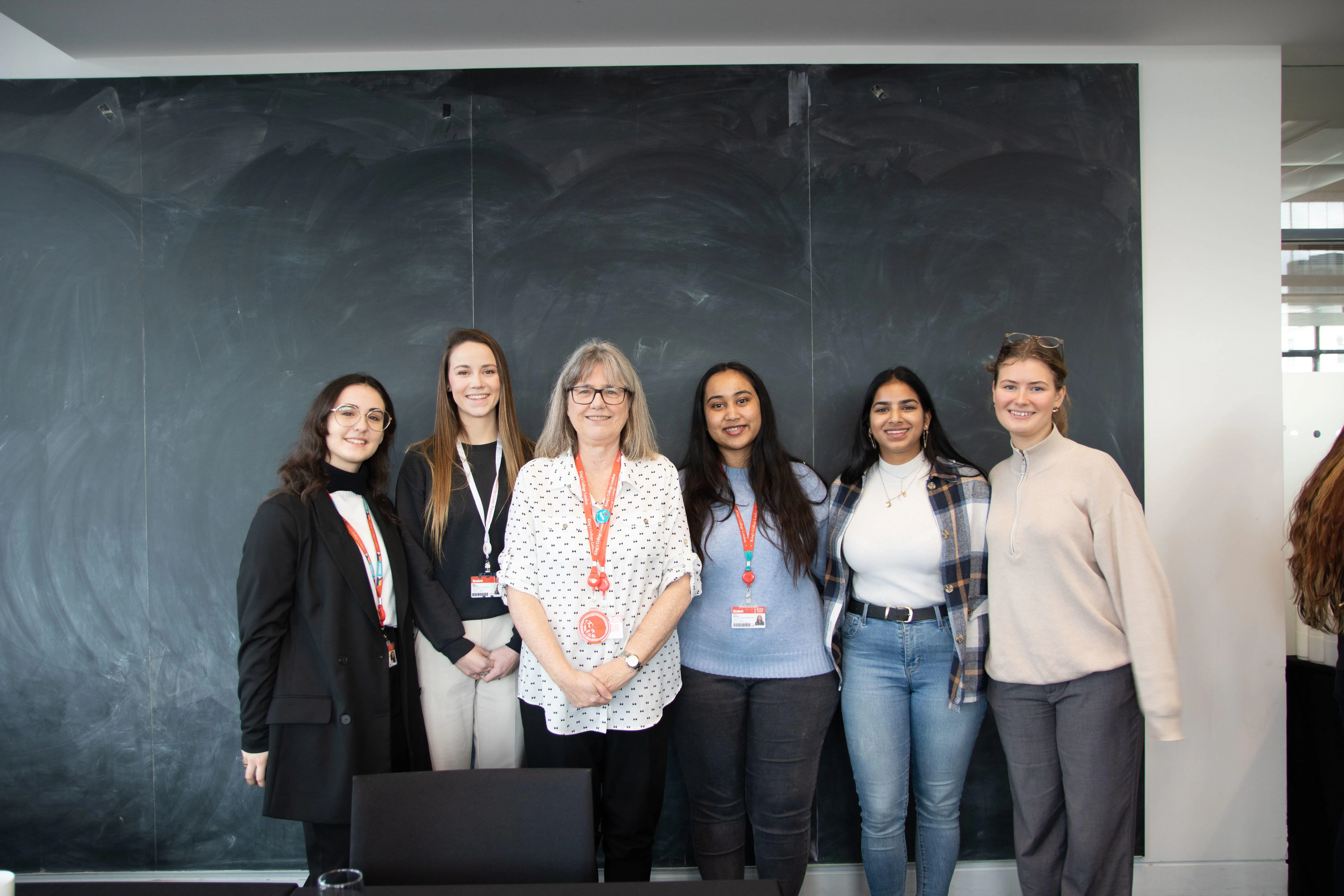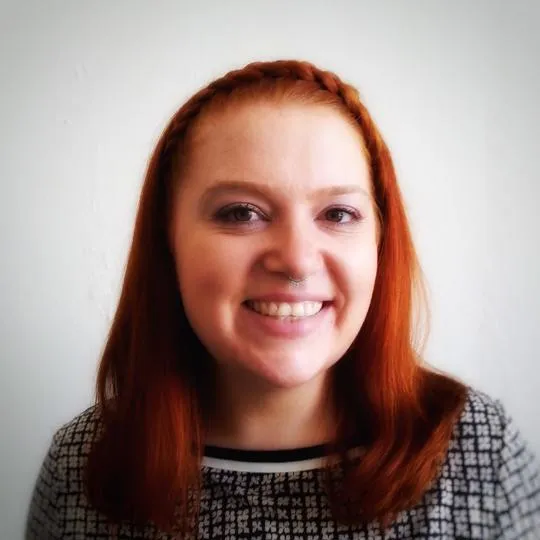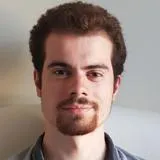I hate sci-fi, travelling at the speed of light just really bugs me, it's not possible…And I always have to correct people when they think that my laser is like a light sabre… lasers are so good…because light goes in one pinpoint not that it goes in all directions."
Donna Strickland
24 February 2023
“That's what scientists do, we explain the magic” - Nobel laureate speaks to Physics PhD students
Donna Strickland 2018 Physics Nobel Laureate recorded a podcast during a visit to King's

Physics Nobel Prize winner Donna Strickland visited the Department of Physics at King's during a recent trip to the UK. The 2018 winner was interviewed by PhD students for a podcast.
Donna is the third woman ever to be awarded the Nobel Prize in Physics, after Marie Curie in 1903 and Maria Goeppert Mayer in 1963. She is an optical physicist and pioneer in the field of pulsed lasers based at Waterloo University in Canada. She received the Nobel Prize along with her doctoral supervisor Gérard Mourou, for work she had undertaken during her PhD, inventing chirped pulse amplification (CPA) - a method of making pulses of laser light of high power and short duration.
She met staff and students from Physics and was interviewed by Vittorio Aita, Dries Maurice and Anne Weber - PhD students from the Photonics and Nanotechnology Group for the London Light Podcast produced by Megan-Grace Hughes.
The discussion covered everything from her career journey and winning the Nobel Prize, to the importance of outreach and public engagement in Physics, to what she does to unwind in her spare time.
One thing she doesn't enjoy is sci-fi:
A career in lasers
The students asked her what got her into lasers. She discussed how in looking for an undergraduate course covering Engineering and Physics, one-fourth of the programme was on lasers and electronics:
"I saw this as a high school student in the 70s, it was really much more sci-fi…[seeing] a laser, now you can get them in a dollar store…so I just thought it was really cool."
Winning the Nobel Prize was never part of her career ambitions growing up:
"It was not my dream…My career goal was to get a PhD all the way through until I was halfway through my PhD when I was like 'shoot I need something more'.
"I wouldn't say I'm ambitious in that way I just want to have fun doing my own thing…
I wish I could've stayed just being a post-doc forever…because you do nothing but science."

Winning the Nobel Prize
The students asked her what it was like to receive the prize in 2018 and how her life changed. She shared how she first heard the news:
"I was sleeping…it's always 11 o'clock Swedish time so that's 5 am our time…They hung up on me – I had to call them."
Going to explain how her family reacted to the news, she talked about her daughter's reaction:
"At 5.30 I texted...and just wrote 'I won the Nobel Prize'…My daughter wakes up and she sees the message says 'oh no mum's phone's been hacked'...Her friend had to tell her it was on the news".
Following her Nobel win Donna had to deliver a public talk as part of receiving the prize, she went on to discuss with the students the importance of public engagement and outreach in science, beyond branches of Physics such as Astrophysics:
"That's what scientists do, we explain the magic…I don't think that every physicist is meant to do outreach, but I think that those that are should be out there doing it.
"My daughter's in astrophysics…[they] do a much better job than most physicists…they also get NASA's help…It would be wonderful if organisations could help in other areas of physics."
She went on to discuss the success her university has had in Waterloo in Canada with outreach efforts:
"It's amazing that Waterloo has more people taking the final year of physics in high school than most places in Canada…and it's probably because we have so much outreach in town. So, physics became cool in Waterloo. The Big Bang Theory also helped."
Donna Strickland
Boosting trust in science
The students concluded by asking her what's been driving her since winning the Nobel Prize, she discussed how she has become part of a campaign called 'TRUST – Trust in research undertaken in science and technology which aims to inform and educate the general public in scientific research and the scientific process, to mitigate some of the damage done to science from misinformation, particularly during the pandemic:
"I wanted to do something helping with science literacy, there's a whole group of people not having the vaccine because political leaders are telling them not to….There should not have been the politicisation of vaccines – nobody should be picking their healthcare based on the way they vote.
"What we want is for the public to have an appreciation for science… because we want politicians to be guided by scientific principles, and they're only going to do it if the people insist on it, so we have to get the people insisting on it."
She also emphasised the importance of science communications for public engagement:
"The communications team really helped [me]…in discussing with these people who…don't study physics at all…helping you figure out, what's making sense what's not making sense.. we really need that practice…I'd like to see most universities have a communications team in every department."
Donna Strickland
The PhD students finished up the conversation by asking Donna what her favourite wavelength for light was, to which she answered 1064 nm – the typical wavelength of light emitted by Nd:YAG lasers, the type used in her Nobel prize-winning research.



